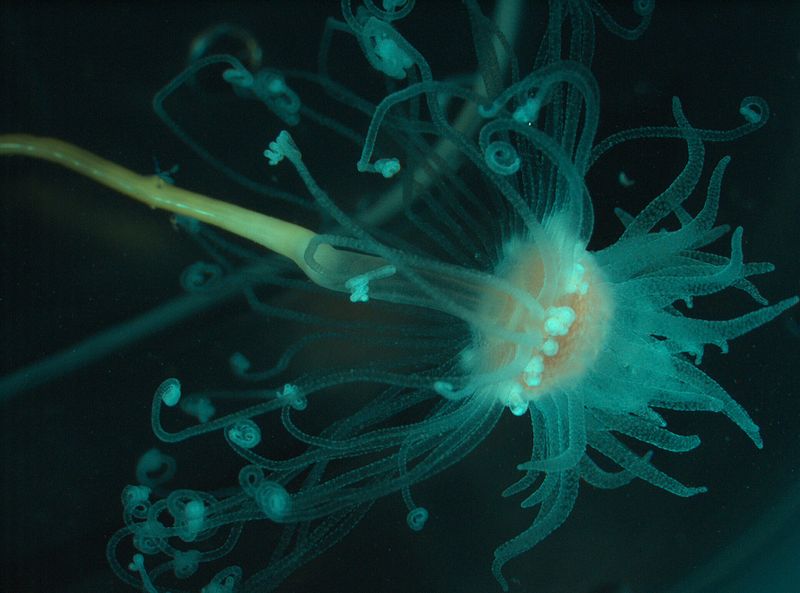 This graceful jellyfish is part of the Cnidaria phylum and lives in the ocean at a depth of 2000 meters. |
![]() Cnidarians are beautiful creatures that can float along in the currents of the ocean, like this box jelly fish
Or they can be attached to the seafloor bottom, like this sea anemone
But all Cnidarians have stinging cells called cnidocytes and nematocysts that hide within their tentacles and can be fired at any moment.
This animation shows how the nematocyst in a cnidarian strikes its prey. It is released from the cnidarian and penetrates the prey.
There are three classes of Cnidarians, Hyrozoa, Scyphozoa, and Anthozoa.
The deadliest Hydrozoa is a Portuguese Man of War.
The Portuguese Man of War has tentacles up to 90 feet long with venom capable of killing humans.
Scyphozoa are true jellyfish, like this lions mane jelly.
Lions mane jellies can be up to 8 feet in diameter.
Anthozoans contain corals and anemones, like this sea anemone.
Anthozoans get their name from the Greek word anthos for flower. Check out this pink sea anemone.
Anthozoans remain in one spot with their tentacles facing upwards, like this purple sea anemone.
All of these Cnidarians are stinging machines thanks to the nematocysts that are deep inside….
Cnidarians are beautiful creatures that can float along in the currents of the ocean, like this box jelly fish
Or they can be attached to the seafloor bottom, like this sea anemone
But all Cnidarians have stinging cells called cnidocytes and nematocysts that hide within their tentacles and can be fired at any moment.
This animation shows how the nematocyst in a cnidarian strikes its prey. It is released from the cnidarian and penetrates the prey.
There are three classes of Cnidarians, Hyrozoa, Scyphozoa, and Anthozoa.
The deadliest Hydrozoa is a Portuguese Man of War.
The Portuguese Man of War has tentacles up to 90 feet long with venom capable of killing humans.
Scyphozoa are true jellyfish, like this lions mane jelly.
Lions mane jellies can be up to 8 feet in diameter.
Anthozoans contain corals and anemones, like this sea anemone.
Anthozoans get their name from the Greek word anthos for flower. Check out this pink sea anemone.
Anthozoans remain in one spot with their tentacles facing upwards, like this purple sea anemone.
All of these Cnidarians are stinging machines thanks to the nematocysts that are deep inside….
What are cnidarians? Give three examples. When you have your answer, click the Show Me button to check your knowledge.

Cnidarians are animals capable of a deadly sting, and some examples include sea anemones, corals, and jellyfish.
Question
Why is it dangerous to touch a jellyfish that has washed ashore on the beach, even if it appears to be dead?
